高中英语过去分词用法详解优秀课件
合集下载
高中英语语法过去分词作状语ppt课件

2. _ v_e_n_ (give) time, he’ll make a first class tennis player.
3. _o_o_k_i_n_g_ (look) out of the window, I
found many children playing on the playground.
18
5) Completely rebuilt, the town would not be so interesting. (if) If it were completely rebuilt, the town would not be so interesting.
19
2. Rewrite with proper conjunctions
cold.
6 . Built thirty years ago the house still looks very
beautiful.
2
练一练:同义句转换 1. As he was surrounded by a group of young
people, the old man felt happy. →
a group of young people, the old man
felt happy.
2 . When he was asked what had happened, he
lowered his head. →
what had happened, he lowered his
head.
3 . Bob sat on his chair and he was completely
E. g. United we stand, divided we fail. →
3. _o_o_k_i_n_g_ (look) out of the window, I
found many children playing on the playground.
18
5) Completely rebuilt, the town would not be so interesting. (if) If it were completely rebuilt, the town would not be so interesting.
19
2. Rewrite with proper conjunctions
cold.
6 . Built thirty years ago the house still looks very
beautiful.
2
练一练:同义句转换 1. As he was surrounded by a group of young
people, the old man felt happy. →
a group of young people, the old man
felt happy.
2 . When he was asked what had happened, he
lowered his head. →
what had happened, he lowered his
head.
3 . Bob sat on his chair and he was completely
E. g. United we stand, divided we fail. →
过去分词用法总结(共53张PPT)
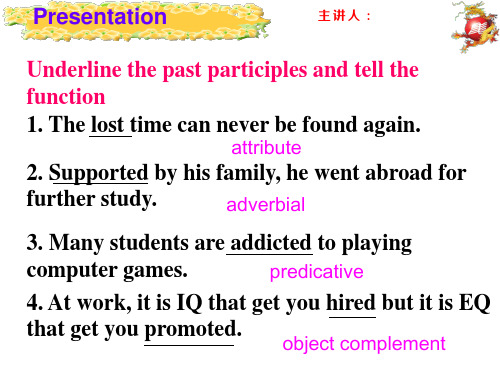
further study.
adverbial
3. Many students are addicted to playing
computer games.
predicative
4. At work, it is IQ that get you hired but it is EQ that get you promoted.
What is the language that is spoken in Italy?
What is the language spoken in Italy?
Do you know all the artists invited to the party?
Do you know all the artists who were invited to the party?
1.语态上
现在分词: 表示主动的动作 过去分词: 表示已经被动的动作
I heard someone opening the door .
I heard the door opened .
2.时间上
现在分词: 表示正在进行的动作 过去分词: 表示完成的意思
the falling leaves boiling water the rising sun the fallen leaves boiled water the risen sun
Presentation
主讲人:
Underline the past participles and tell the
function
1. The lost time can never be found again.
attribute
高中英语 过去分词作定语课件(通用)
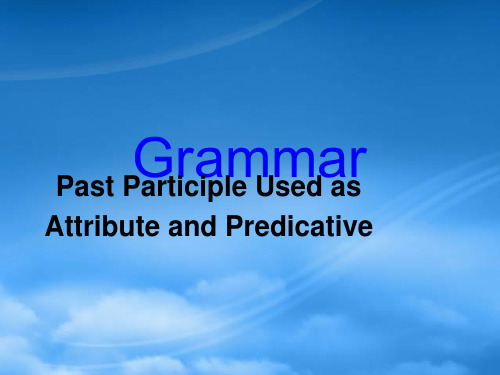
一、过去分词作定语
3. 过去分词可作非限制性定语,相当于 省略式的定语从句。 e.g ① The books, (which were) written by Lu Xun, were very popular. ② The bridge, (which was) built in 1999, is very beautiful.
解析:D
考题练练看
4. I don't know the girl ________ in the snow storm.
A. to catch
B. caught
C. catching catching
D. to be
解析:B 小女孩被困在暴风雪中, 所以应用过去分词作后置定语。
二、过去分词作表语
考题练练看
3. Don’t use words, expressions or phrases ____ only to people with specific knowledge. A. being known B. having been known C. to be known D. known
二、过去分词作表语
2.许多动词的过去分词已经被 当作形容词使用。如: broken, disappointed, excited, moved, puzzled, pleased, surprised, lost等。
⊿过去分词作表语与 被动语态的区别
• -ed作表语主要表示动作的完成 和状态,相当于一个形容词;
Grammar
Past Participle Used as Attribute and Predicative
Task one
Look at the following story and find the usage of past participle (“-ed”)
高中英语语法——过去分词作状语(32张PPT)-经典通用课件资料
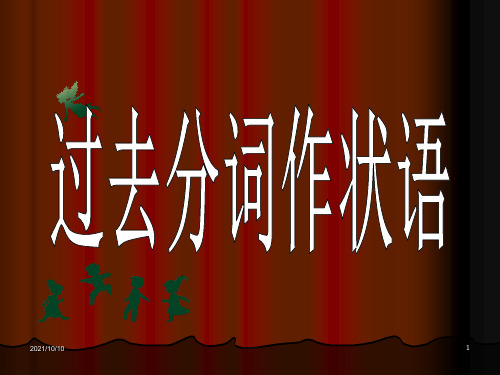
2021/10/10
9
The film star appeared, surrounded by a group of fans. =The film star appeared and was surrounded by a group of fans.
2021/10/10
10
用括号内所给动词的适当形式填空。
2021/10/10
7
4. 表示让步 表示让步,相当于although/though引导的让步状语从句.
ughed at by many people, he continued his study. 2.Badly wounded, he continued to fight.
Though he was laughed at by many people, he continued his study. Though he was badly wounded, he continued to fight.
2021/10/10
20
7. 现在分词、过去分词和不定式作状语的区别
2021/10/10
3
ห้องสมุดไป่ตู้
1.过去分词作时间状语
1. Seen under a microscope, a fresh snowflake has a delicate (精美的) shape. When it is seen under a microscope, a fresh snowflake(雪花) has a delicate shape.
3.Given good weather, our ship will reach Shanghai this evening. 假如天气好,我们的船将于今晚抵达上海。
最新高中英语-过去分词PPT课件

It was snowing and very cold outside. A little girl was walking in the street, selling matches.
She didn’t wear any shoes because she had her shoes__lo_s_t_.
I saw her taken out of the classroom.
I saw her come into the classroom.
I saw her coming into the classroom.
【高考链接】
(2015·陕西高考)Back from his two-year medical
She lit a match and saw a Christmas tree _de_c_or_at_e_d wit_ed__ match was burning brightly and she seemed h
very __d_e_lig_h_te_d___.
service in Africa, Dr Lee was very happy to see
his mother taken(take) good care of at home.
【思路演示】 分析句式: 该句是“see+宾语+宾语补足语”结构,宾语 补足语可以是do, doing或者done。理清句意: 在非洲 医疗援助两年回来后, 李博士很高兴看到妈妈被照顾得 很好。 抓取关键: his mother与take good care of之间为动宾 关系, 故要用过去分词作宾语补足语。 断定答案: taken。
过去分词作定语相当于一个定语从句 *The lighted match was burning brightly. ——The match which was lighted was burning brightly.
高中英语 过去分词的用法全面(共46张ppt)
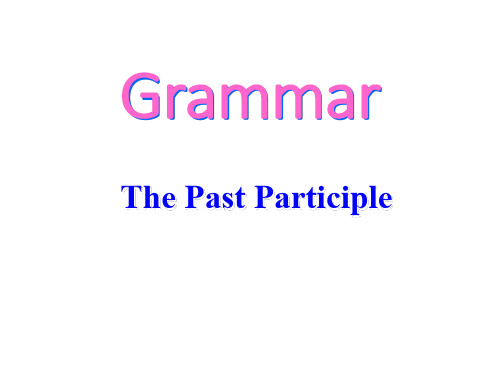
quite importanBiblioteka e. being discussed
to be discussed
注:ing分词作定语有时意义不同:
flying fish 飞鱼 a running dog 走狗 a falling tide 落潮 a crying boy 哭着的孩子
a running machine a swimming pool a waiting room a walking stick a fishing pole a reading room
eg: surprised/ surprising; encouraged/ encouraging; moved/ moving...
二、作定语 (attribute)
1. 前置定语:单个的v-ed作定语,一般放在 被修饰的n.之前; 后置定语:v-ed短语作定语时,常被放在被 修饰的n.之后,相当于一个定语从句。 eg: an invited guest 一位受到邀请的客人
eg: The cup is broken. 系表结构表状态
The cup was broken by Tom. 被动语态表动作
注意比较:
3. 过去分词v-ed和v-ing作表语的区别:
过去分词v-ed: 表主语(人)所处的心理状态, 个人的感受. “(人)感到...”
现在分词v-ing: 表主语(物或人)所具有的特征. “(物或人)令人...”
eg: The letter posted today will reach you in a week. =
The letter which was posted today will...
(2) 若是vi.的过去分词作定语只表示动作的完 成,不表被动,可改成v.用完成时态的定语 从句。
to be discussed
注:ing分词作定语有时意义不同:
flying fish 飞鱼 a running dog 走狗 a falling tide 落潮 a crying boy 哭着的孩子
a running machine a swimming pool a waiting room a walking stick a fishing pole a reading room
eg: surprised/ surprising; encouraged/ encouraging; moved/ moving...
二、作定语 (attribute)
1. 前置定语:单个的v-ed作定语,一般放在 被修饰的n.之前; 后置定语:v-ed短语作定语时,常被放在被 修饰的n.之后,相当于一个定语从句。 eg: an invited guest 一位受到邀请的客人
eg: The cup is broken. 系表结构表状态
The cup was broken by Tom. 被动语态表动作
注意比较:
3. 过去分词v-ed和v-ing作表语的区别:
过去分词v-ed: 表主语(人)所处的心理状态, 个人的感受. “(人)感到...”
现在分词v-ing: 表主语(物或人)所具有的特征. “(物或人)令人...”
eg: The letter posted today will reach you in a week. =
The letter which was posted today will...
(2) 若是vi.的过去分词作定语只表示动作的完 成,不表被动,可改成v.用完成时态的定语 从句。
过去分词课件PPT课件
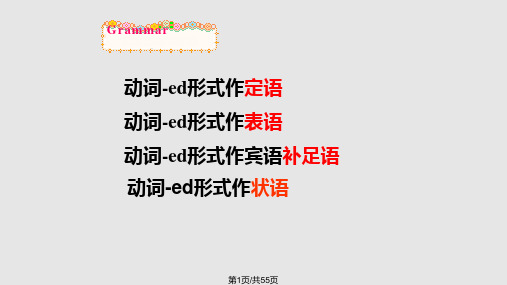
Grammar
动词-ed形式作定语 动词-ed形式作表语 动词-ed形式作宾语补足语 动词-ed形式作状语
第1页/共55页
一、动词-ed形式作定语
过去分词作定语往往与被修饰的词靠得很 紧, 渐渐地成为一个复合词。这种分词叫分词
形容词 (the Participle Adjective), 实际上相当
动词的-ed形式可以在“主语+谓语+宾 语+宾语补足语”句型中充当宾语补足语。 在这一结构中, 动词-ed形式和它前面的宾 语构成逻辑上的被动关系。如果这种句子 改为被动语态,原来的宾语补足语变成了主 语补足语。
第17页/共55页
People found the girl beaten black and blue. 人们发现这个女孩被打得青一块紫一块。 (宾语补足语) The girl was found beaten black and blue. (主语补足语)
He grew much tired of the work.
他十分厌倦这工作。
He seemed quite delighted at the idea.
听了这想法他似乎很高兴。 第12页/共55页
高考题
1) Cleaning women in big cities usually get
____ by the hour. (NMET98)
I have never heard him spoken ill of others.
我从未听过有人说他的坏话。
She felt a great weight taken off her mind.
她觉得心里轻松了些。
They considered the matter settled.
动词-ed形式作定语 动词-ed形式作表语 动词-ed形式作宾语补足语 动词-ed形式作状语
第1页/共55页
一、动词-ed形式作定语
过去分词作定语往往与被修饰的词靠得很 紧, 渐渐地成为一个复合词。这种分词叫分词
形容词 (the Participle Adjective), 实际上相当
动词的-ed形式可以在“主语+谓语+宾 语+宾语补足语”句型中充当宾语补足语。 在这一结构中, 动词-ed形式和它前面的宾 语构成逻辑上的被动关系。如果这种句子 改为被动语态,原来的宾语补足语变成了主 语补足语。
第17页/共55页
People found the girl beaten black and blue. 人们发现这个女孩被打得青一块紫一块。 (宾语补足语) The girl was found beaten black and blue. (主语补足语)
He grew much tired of the work.
他十分厌倦这工作。
He seemed quite delighted at the idea.
听了这想法他似乎很高兴。 第12页/共55页
高考题
1) Cleaning women in big cities usually get
____ by the hour. (NMET98)
I have never heard him spoken ill of others.
我从未听过有人说他的坏话。
She felt a great weight taken off her mind.
她觉得心里轻松了些。
They considered the matter settled.
高中教育英语必修第一册人教版《4.3 过去分词作定语和宾语补足语》教学课件

developed countries
发展中国家 发达国家
③On the other hand, I hope to broaden my horizons in this developed country. 另一方面, 我希望在这个发达国家拓宽我的视野。
④As is known to us, China is a developing country. 众所周知, 中国是一个发展中国家。
among the students in the school. 去年开放的计算机中心在这个学校的学生中很受欢迎。 ②The Olympic Games, first played in 776 BCE, didn't include women
until 1912. =The Olympic Games, which was first played in 776 BCE, didn't
find them addicted to their phones. 当人们吃饭或者等公交的时候, 你会发现他们痴迷于玩手机。 4.表示“意愿;命令”的动词,如like,want,wish,expect,order等
后可用过去分词作宾语补足语。
The manager ordered the work finished at the end of this week. 经理要求在本周末完成这项工作。
(2)在“make+宾语+过去分词”这种结构中,过去分词表示结果。 ③They managed to make themselves understood by using very simple
English. 他们用很简单的英语来设法使自己被理解。
3.感官动词see,hear,notice,observe,watch,feel,find等后, 可用过去分词作宾语补足语。
高中英语过去分词的用法课件(共53张PPT)

– Can those ____ at the
back of the classroom
hear me?
A. seat
B. sit
C. seated D. sat
35、___ in the queue for half an hour, the man suddenly realized he had left the money in the car. A. Waiting B. To wait C. Having Waited D. To have waited
非谓语动词的用法讲解:
过去分词的用法
过去分词作定语
作定语用的过去分词相当于形容词,表被动或表完成
1. 过去分词用作定语,如果是单个词语,常置于其所修 饰的名词之前。
The injured workers are now being taken care of in the hospital.
2.过去分词用作定语,如果是短语,一般置于其所修饰的 名词之后,其意义相当于一个定语从句。
The two theories were interesting. The news were disappointing. The result of the exam is delighting. What he does is satisfying.
• They were __s_u_rp__ri_s_e_d__ at the news.(惊奇于)
因为写得匆忙,这篇文章不是很好。
值得注意的是,有些过去分词作状语时不表 被动而表主动。这样的过去分词及短语常见 的有:
lost ( 迷 路 ) ; seated ( 坐 ) ; hidden ( 躲 ) ; stationed ( 驻 扎 ) ; lost / absorbed in ( 沉 溺 于 ) ; born (出身于); dressed in (穿着); tired of (厌烦)。
《过去分词的用法》PPT课件
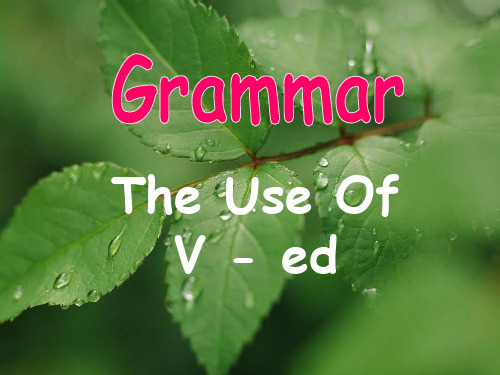
--精品--
1. Past Participle used as attribute
The ground is covered by __fa__ll_e_n___
(fall) leaves.
--精品--
These __w__a_n_t_e_d__ (want) people
are from Hong Kong.
--精品--
Translation
1. 我有些话要说。 I have some words to say. 2. 昨天我理了发。 I had my hair cut yesterday.
--精品--
3. 我叫弟弟寄了一封信。 I had my brother post a letter.
4. 别让机器一直开着。 Don’t have the machine running.
The excited person--i精s品-R- onaldo.
作定语
单词分词+被修饰的词 被修饰的词+分词短语
1、现在分词作定语,当分词单独做定语时,放在所修饰 的名词前;如果是分词短语做定语放在名词后。
They found a damaged car at the gate of the park.
--精品--
2. Past Participle used as predicative
The shop is __c_l_o_s_e_d__(close).
--精品--
Cleaning women in big cities usually
get __p_a_i_d_ (pay) by the hour.
A. smoke B. smoking C. to smoke D.smoked
1. Past Participle used as attribute
The ground is covered by __fa__ll_e_n___
(fall) leaves.
--精品--
These __w__a_n_t_e_d__ (want) people
are from Hong Kong.
--精品--
Translation
1. 我有些话要说。 I have some words to say. 2. 昨天我理了发。 I had my hair cut yesterday.
--精品--
3. 我叫弟弟寄了一封信。 I had my brother post a letter.
4. 别让机器一直开着。 Don’t have the machine running.
The excited person--i精s品-R- onaldo.
作定语
单词分词+被修饰的词 被修饰的词+分词短语
1、现在分词作定语,当分词单独做定语时,放在所修饰 的名词前;如果是分词短语做定语放在名词后。
They found a damaged car at the gate of the park.
--精品--
2. Past Participle used as predicative
The shop is __c_l_o_s_e_d__(close).
--精品--
Cleaning women in big cities usually
get __p_a_i_d_ (pay) by the hour.
A. smoke B. smoking C. to smoke D.smoked
Unit2语法-过去分词作定语、表语、宾补、状语课件课件-高中英语人教版(2019)选择性必修第四册
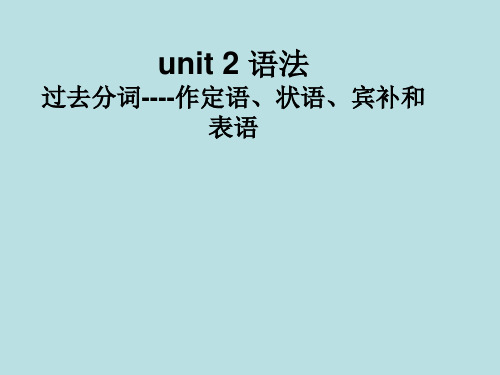
难点突破: V-ed和V-ing形式作表语的区别?
1. The result of the final English test was
rather __d_i_s_a_p_p_o_i_n_t_i.ng
He was very _d_isapp__o_in_ ted at the result
of the final test. ( disappoint ) 2. The _f_r_ig_h_t_e_n_i_n_g___man with an ugly black
(Ved)
1. From her _______ look, I knew she was
unsatisfied.
A. disappointing B. disappoints
C. to disappoint
D. disappointed
2. Hearing the tiger's _______ voice, she was so ___________. A. scared, scared B. scared , scaring C. scaring, scared D. scaring, scaring
3. 形容词化的过去分词:
_a_m__a_z_e_d_,_s_u_r_p_ri_s_e_d_,___________ _s_c_a_r_e_d_,_w__o_rr_i_ed__, _d_is_a_p_p_o_i_n_t_e_d_, _ _e_x_c_i_te_d__, _d_e_li_g_h_te_d_,__p_le_a_s_e_d__, ___ __s_at_i_s_fi_e_d_, _m_o_v_e_d_,_d_e_v_o__te_d_,_.._. ___
高中英语语法 过去分词的用法(21张PPT)

the risen sun a lost child
已经升起的太阳 丢失的孩子
过去分词短语作定语时,位于它所 修饰的名词或代词后面。
people addicted to drugs a novel written by Luxun
the advice given to the patient
an old man supported by his son a school built for orphans
落叶
the risen sun 升起来的太阳
the advanced countries 发达国家
a drunken man 一个醉鬼
a returned student 一名留学生
a retired teacher 一名退休教师
an escaped prisoner 一名逃跑的囚犯
by-gone days
• The tiger looks _fr_i_g_h_te_n_in(gfrighten), but LiPing wasn’t __fr_ig_h_t_e_n_ed (frighten).
Cleaning women in big cities usually get ____ by the hour.
2. Exciting story
感到失望的人们
Excited people 2. 激动人心的故事
(感到)激动的人们
3.
Tired tired
people/
I’m
3. 累了的人/我感到累了 (使人觉得)无聊的电影
4. Tiring film
V-ed
感到…的
is interesting. I'm interested in English.
高中英语过去分词用法详解课件可修改文字
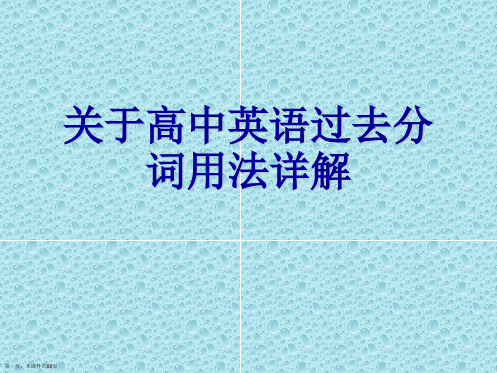
the young lady was no longer afraid.
第八页,本课件共66页
2. Because it was done in a hurry, his homework was full of mistakes. Done in a hurry, his homework was full of mistakes.
Exhausted, I slid into bed and fell fast asleep.
第二十四页,本课件共66页
Compare
1. Following the old man, we went
upstairs.—we followed
(跟着那个老人, 我们上去了)
2. Followed by the old man, we went
由于用了很长时间,这本书看上去很旧.
_U_s_i_n_g_ the book, I find it useful. 在使用的过程中,我发现这本书很有用. _L_o_o__k_in__gat her, he jumped with joy. _L_o_o_k_e_d_at by her, he jumped with joy.
第二十七页,本课件共66页
注意: 选择现在分词还是过去分词, 关 键看主句的主语。如分词的动作是主 句的主语发出, 分词就选用现在分词,反
之就用过去分词。
第二十八页,本课件共66页
Complete each sentence using the Past Participle of the right verb.
froAm the space, the astronaut can not
discover the Great Wall. A.
第八页,本课件共66页
2. Because it was done in a hurry, his homework was full of mistakes. Done in a hurry, his homework was full of mistakes.
Exhausted, I slid into bed and fell fast asleep.
第二十四页,本课件共66页
Compare
1. Following the old man, we went
upstairs.—we followed
(跟着那个老人, 我们上去了)
2. Followed by the old man, we went
由于用了很长时间,这本书看上去很旧.
_U_s_i_n_g_ the book, I find it useful. 在使用的过程中,我发现这本书很有用. _L_o_o__k_in__gat her, he jumped with joy. _L_o_o_k_e_d_at by her, he jumped with joy.
第二十七页,本课件共66页
注意: 选择现在分词还是过去分词, 关 键看主句的主语。如分词的动作是主 句的主语发出, 分词就选用现在分词,反
之就用过去分词。
第二十八页,本课件共66页
Complete each sentence using the Past Participle of the right verb.
froAm the space, the astronaut can not
discover the Great Wall. A.
过去分词用法-PPT课件

•9
定语
3. 被修饰词是由 不定代词 Every/ some/ any/no + thing/ body 所构成的,V-ed后置。 例:有人受伤吗? Is anybody injured?
•10
定语
4. V-ed 短语做(后置)定语,相当于定语从句 He is reading a novel written by Lu Xun. He is reading a novel (which was) written by Lu Xun.
•23
宾语补足语
• 3. 表“希望”、“要求”、“命令” 等 • 如 like, want, wish, order……
例:我可不想我的女儿天黑以后被带出去 I don’t want my daughter to be taken out after dark.
* Want to do sth. Want sb./ sth. done (被动)
•24
宾语补足语
• (to) V./ V-ing/ V-ed 作宾补的区别 I saw him take away the book just now. 主动(结果) I saw him taking away the book on the desk正. 在(过程) I saw the book taken away by a child. 被动
* See sb./ sth. done
•21
宾语补足语
2. 表“使让” 使役动词(let, make, get, keep, leave, have) + V-ed, 表使让。
It was so cold that the driver couldn’t get the car started.
定语
3. 被修饰词是由 不定代词 Every/ some/ any/no + thing/ body 所构成的,V-ed后置。 例:有人受伤吗? Is anybody injured?
•10
定语
4. V-ed 短语做(后置)定语,相当于定语从句 He is reading a novel written by Lu Xun. He is reading a novel (which was) written by Lu Xun.
•23
宾语补足语
• 3. 表“希望”、“要求”、“命令” 等 • 如 like, want, wish, order……
例:我可不想我的女儿天黑以后被带出去 I don’t want my daughter to be taken out after dark.
* Want to do sth. Want sb./ sth. done (被动)
•24
宾语补足语
• (to) V./ V-ing/ V-ed 作宾补的区别 I saw him take away the book just now. 主动(结果) I saw him taking away the book on the desk正. 在(过程) I saw the book taken away by a child. 被动
* See sb./ sth. done
•21
宾语补足语
2. 表“使让” 使役动词(let, make, get, keep, leave, have) + V-ed, 表使让。
It was so cold that the driver couldn’t get the car started.
过去分词用法详解ppt课件
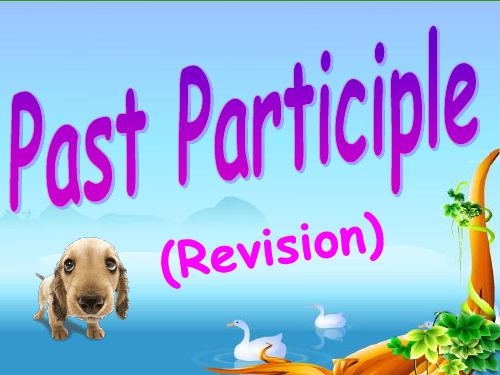
A. recorded
B. record
D. having recorded
4.Linda worked for the Minnesota Manufacturing and Mining
company, _B__as 3M.(04’ZJ)
A. knowing B. known C. being known D. to be known
6
﹡ ﹡ The differences (used as Attribute)
5. to do 表示一个将来的动作 to be done 表示一个将来的被动动作 doing 表示一个正在进行的主动动作 being done 表示一个正在进行的被动动作 e.g. I have much work to do. The building to be finished at the end of this year will be our lab
2.介词with+宾语+过去分词
The thief was brought in with his hands tied behind his back. With all the work finished, he went back.
15
Exercises:
1.You should understand the traffic rule by now. You’ve had it
5.----Shall we go swimming ?
----OK. I’ll just go and get __A___.
A. changed B. to change C. to be changed D. changing
13
Step Ⅲ used as Object Complement 1.及物动词的过去分词作宾补表示一个完成且被动的动 作; 不及物动词的过去分词作宾补只表示动作的完成和 状态。
- 1、下载文档前请自行甄别文档内容的完整性,平台不提供额外的编辑、内容补充、找答案等附加服务。
- 2、"仅部分预览"的文档,不可在线预览部分如存在完整性等问题,可反馈申请退款(可完整预览的文档不适用该条件!)。
- 3、如文档侵犯您的权益,请联系客服反馈,我们会尽快为您处理(人工客服工作时间:9:00-18:30)。
PP作时间状语, 相当于一个时间状语 从句有时过去分词前可加连词when或 while来强调时间概念。
过去分词作时间状语
1. When it is heated, ice will be changed into water. When heated, ice will be changed into water.
2. When it is seen under a microscope, a fresh snowflake has a delicate sixpointed shape. Seen under a microscope, a fresh snowflake has a delicate six-pointed shape.
6. Deeply interested in medicine, she decided to become a doctor. Because she was deeply interested in medicine, she decided to become a doctor.
4. Given more time, we would be able to do the work much better. If we were given more time, we would be able to do the work much better.
5. Once translated into Chinese, the book became very popular among Chinese teenagers. Once it was translated into Chinese, the book became very popular among Chinese teenagers.
过去分词表完成、被动, 作状语时, 其逻辑主语是主句的主语, 且与主语 之间存在着被动关系。过去分词作 状语可表时间、原因、 让步、 结果、 方式、 条件等。
观察下列的句子:
Once published, his works (=Once his works was published, ) became famous for the absence of rhyme at the end of each line.
2. Because it was done in a hurry, his homework was full of mistakes. Done in a hurry, his homework was full of mistakes.
过去分词作条件或者假设状语
1. If they had been given more attention, the cabbages could have grown better. Given more attention, the cabbages could have grown better.
2. If I am compared with you, we still have a long way to go. Compared with you, we still have a long way to go.
作方式或伴随情况状语
1. The hunter left his house, followed by his dog. The hunter left his house, and he was followed by his dog.
过去分词作原因状语
1. Since/ As she was given advice by the famous detective, the young lady was no longer afraid. Given advice by the famous detective, the young lady was no longer afraid.
2. She sat by the window, lost in thought. She sat by the window, and she was lost in thought. lost 表示分词在句子中可以作时间状语、 原因状语、伴随状语、条件状语和 让步状语等。
高中英语过去分词用 法详解优秀课件
过去分词
过去分词是非谓语动词的一种形式, 表示完成和被动的动作。它在句子 中可以充当状语、定语等成分。
一、过去分词作状语
过去分词与现在分词作状语 过去分词表完成、被动, 与主句主语之间 是被动关系; 现在分词表进行、主动, 与 主句主语之间是主动关系。如果一个被动 的动作发生在谓语动词之前, 则可使用现在 分词的完成被动式或过去分词。
1. United we stand, divided we fail. If we are united, we will stand, but if we are divided, we will fail.
2. Asked what had happened, he told us about it.
→When he was asked what had happened, he told us about it.
3. Well known for his expert advice, he received many invitations to give lectures.
→Because he was well known for his expert advice, he received many invitations to give lectures.
2) 过去分词作状语时,过去分词的逻辑 主语与句子主语一致。
过去分词作状语:
过去分词有两大特点:
1. 表示被动的动作; 2. 表示已经完成的动作, 因此,当过去分
词作状语的时候一定要搞清楚分词与 主语的逻辑关系--被动, 例如:
Rewrite with proper conjunctions
Example:
过去分词作时间状语
1. When it is heated, ice will be changed into water. When heated, ice will be changed into water.
2. When it is seen under a microscope, a fresh snowflake has a delicate sixpointed shape. Seen under a microscope, a fresh snowflake has a delicate six-pointed shape.
6. Deeply interested in medicine, she decided to become a doctor. Because she was deeply interested in medicine, she decided to become a doctor.
4. Given more time, we would be able to do the work much better. If we were given more time, we would be able to do the work much better.
5. Once translated into Chinese, the book became very popular among Chinese teenagers. Once it was translated into Chinese, the book became very popular among Chinese teenagers.
过去分词表完成、被动, 作状语时, 其逻辑主语是主句的主语, 且与主语 之间存在着被动关系。过去分词作 状语可表时间、原因、 让步、 结果、 方式、 条件等。
观察下列的句子:
Once published, his works (=Once his works was published, ) became famous for the absence of rhyme at the end of each line.
2. Because it was done in a hurry, his homework was full of mistakes. Done in a hurry, his homework was full of mistakes.
过去分词作条件或者假设状语
1. If they had been given more attention, the cabbages could have grown better. Given more attention, the cabbages could have grown better.
2. If I am compared with you, we still have a long way to go. Compared with you, we still have a long way to go.
作方式或伴随情况状语
1. The hunter left his house, followed by his dog. The hunter left his house, and he was followed by his dog.
过去分词作原因状语
1. Since/ As she was given advice by the famous detective, the young lady was no longer afraid. Given advice by the famous detective, the young lady was no longer afraid.
2. She sat by the window, lost in thought. She sat by the window, and she was lost in thought. lost 表示分词在句子中可以作时间状语、 原因状语、伴随状语、条件状语和 让步状语等。
高中英语过去分词用 法详解优秀课件
过去分词
过去分词是非谓语动词的一种形式, 表示完成和被动的动作。它在句子 中可以充当状语、定语等成分。
一、过去分词作状语
过去分词与现在分词作状语 过去分词表完成、被动, 与主句主语之间 是被动关系; 现在分词表进行、主动, 与 主句主语之间是主动关系。如果一个被动 的动作发生在谓语动词之前, 则可使用现在 分词的完成被动式或过去分词。
1. United we stand, divided we fail. If we are united, we will stand, but if we are divided, we will fail.
2. Asked what had happened, he told us about it.
→When he was asked what had happened, he told us about it.
3. Well known for his expert advice, he received many invitations to give lectures.
→Because he was well known for his expert advice, he received many invitations to give lectures.
2) 过去分词作状语时,过去分词的逻辑 主语与句子主语一致。
过去分词作状语:
过去分词有两大特点:
1. 表示被动的动作; 2. 表示已经完成的动作, 因此,当过去分
词作状语的时候一定要搞清楚分词与 主语的逻辑关系--被动, 例如:
Rewrite with proper conjunctions
Example:
